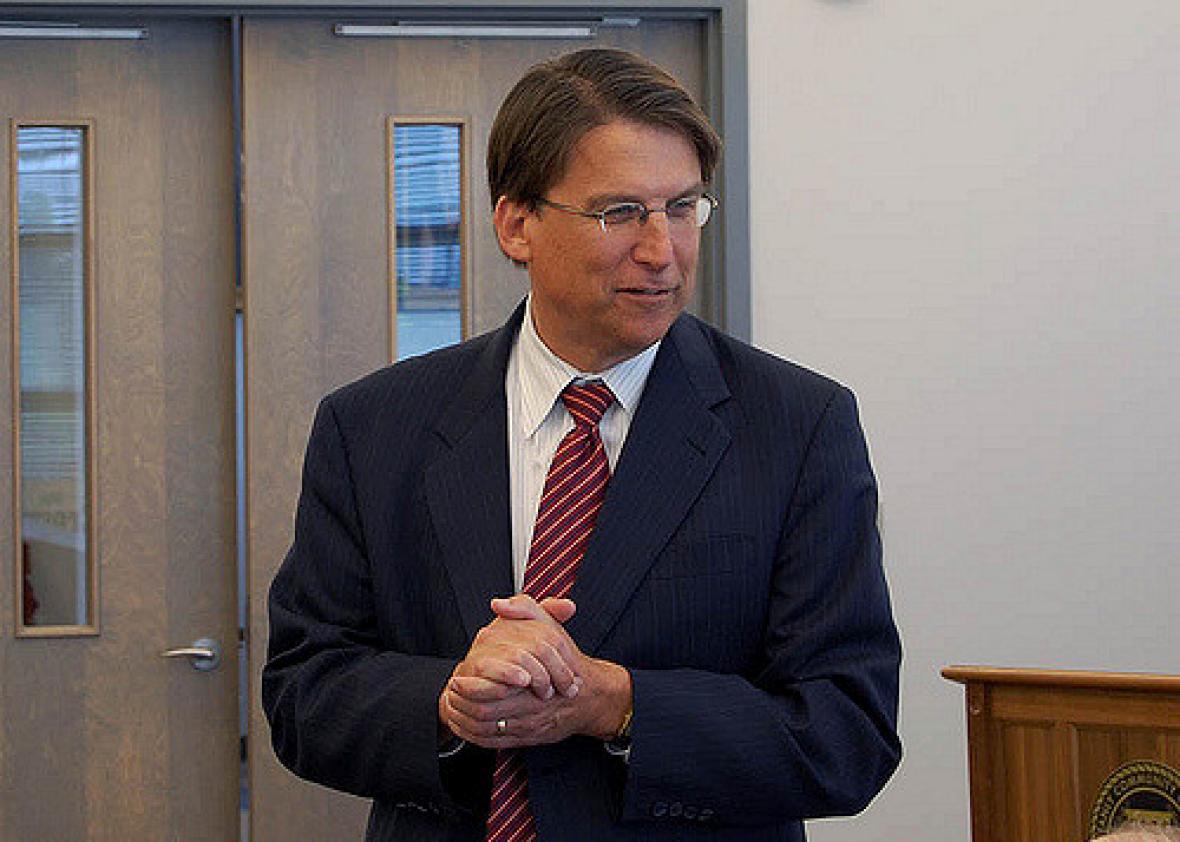The modern Republican Party prides itself on its absolute support for free speech. So vigorous is the GOP’s support for the First Amendment that the party opposes any limit on corporate electioneering or campaign contributions, insisting that the ability to donate unlimited money to a politician is a critical form of political expression. It was thus surprising to see the North Carolina GOP attempt to censor a newspaper-hosted bipartisan public forum on the controversial HB2 this week by shutting it down and punishing its sponsors.
If this sounds like an unbelievable level of direct censorship, take a look at the complaint that the North Carolina Republican Party filed with the State Board of Elections. The complaint notes that the forum, while hosted by the Charlotte Observer, is sponsored in part by Red Ventures, LLC, a marketing company whose CEO supports Republican Gov. Pat McCrory’s Democratic opponent, Roy Cooper. It also charges the company with supporting Cooper by providing employees time off on Election Day—probably so they can “vote for Roy Cooper and other democrat candidates,” the letter sneers. Moreover, the complaint points out that the forum would discuss polling data compiled by Public Policy Polling. PPP “conducts opinion polling that has an [sic] bias in favor of the Democrat Party,” the complaint declares, pointing out that its CEO supports Cooper. Taken together, these facts can only lead to one conclusion: The forum is actually a corporate contribution to Cooper’s campaign, in violation of state election law:
While this event is being advertised as nothing more than a forum, its proximity in time to the general election and its focus on an issue repeatedly raised by the democrat party and Roy Cooper belies the true purpose and motivation behind the event. … [A] forum sponsored by a corporation owned and operated by known and substantial Roy Cooper supporters, assisted by a [sic] opinion polling company that is openly biased towards the democrat party and its candidates, and hosted by a newspaper publishing company who has publicly endorsed Roy Cooper and numerous democrat candidates [qualifies] as a “contribution.”
And if the forum isn’t a “contribution,” the complaint continues, it must at least rise to the level of an illegal “independent expenditure” on Cooper’s behalf. In light of these facts, the complaint concludes, the forum must be “immediately canceled, and the entities be appropriately sanctioned.”
There are two interesting threads to draw out of the GOP’s letter. The first is that apparently the party is no longer willing to defend political expression that might violate campaign finance law but, in the GOP’s view, deserves First Amendment protection. When a corporation wished to break federal law by selling a movie-length ad critical of Hillary Clinton, the Republican Party supported it. When a Republican donor wanted to give more money to conservative candidates than he was allowed to under a federal statute, the Republican Party supported him. But when a newspaper wants to put on a public forum to explore both sides of the HB2 debate, the Republican Party tries to censor it. What changed?
The second thread here is even more interesting: Apparently, the North Carolina GOP is terrified of open and honest discussion about the bill it insists is being mispresented and unfairly attacked. The forum included both proponents and opponents of HB2, and allowed the bill’s supporters to speak extensively about why they believed transgender people should be excluded from public bathrooms. To balance out these claims, of course, the forum also included HB2 detractors—but the conversation was civil and balanced, devoid of propaganda, heavy on candor. It was, in short, a frank discussion of a hot-button political issue, exactly the type of speech and association the First Amendment was designed to protect.
Obviously, given that the event occurred, the state board of elections declined to shut it down. Perhaps the board recognized that the forum could not plausibly qualify as a “contribution” or “expenditure” under state law; perhaps it understood that any intervention would undoubtedly qualify as unconstitutional censorship, opening up the board to civil liability. Either way, the entire episode ultimately provided a great deal of welcome clarity: It seems the North Carolina Republican Party is not so much eager to defend HB2 as it is anxious to stifle any potential criticism of the bill. That might be a rational reaction to a law that is sinking Republicans in the polls. But it is also a stark betrayal of the First Amendment values that Republicans today allege to hold so dear.
